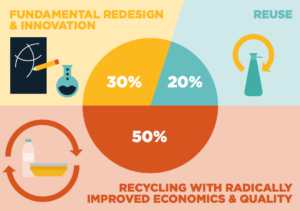At the 2017 World Economic Forum in Davos the Ellen MacArthur Foundation and the New Plastics Economy initiative presented their new report “The New Plastics Economy – Catalysing Action”. The report provides a set of concrete actions to drive the transition towards a new plastics economy. The report follows the recommendations of the 2016 report “Rethinking the Future of Plastics”, which for the first time looked at the global plastic material flows and, derived from these findings, provided an overarching vision of a new plastics economy that aligns with the principles of the circular economy and in which bioplastics play an essential role.
According to the new report, at least 20 percent of (single-use) plastic packaging could easily be replaced with reusable alternatives. About 30 percent of plastic packaging, however, would have to be fundamentally redesigned in order to be reused or recycled more effectively. Therefore, the development and adoption of innovative materials and recyclable or compostable alternatives have been identified as top priorities in the report.
In particular applications that are prone to be mixed with organic contents during or after use (food packaging, coffee capsules, foodserviceware), which are difficult to sort and clean for high-quality recycling, should be made from compostable materials that can be disposed of, together with their contents, in the biowaste bin. According to the report, “this would increase the value capture of organic material through composting or anaerobic digestion”. Yet, to allow for the wider use of compostable plastic packaging adequate infrastructure (separate collection of organic waste, composting or anaerobic digestion facilities) need to be to be put in place and widely available.
With concerted efforts on design and after-use systems, says the report, recycling would be economically attractive for the remaining 50 percent of plastic packaging.

Three distinct transitions strategies to accelerate the shift towards the new plastics economy (Source: NPE initiative analysis, 2017)
Unfortunately, the recommendations mainly focus on the stages of packaging design and after-use of plastic packaging. The report misses the opportunity to analyse and promote the benefits of greater use and development of innovative materials, such as bio-based plastics. Although the report clearly states that “sourcing feedstock from renewable and sustainable sources could accelerate the transition to a new plastics economy by decoupling plastics and economic growth from fossil feedstock”, it fails to incorporate these economic and environmental benefits of bio-based plastics in the recommendations. Using feedstock from renewable sources helps to increase resource efficiency, reduce the greenhouse gas footprint of plastic packaging, and potentially act as a carbon sink throughout their life cycle. Supporting only the use of compostable plastics falls short of what the report aims to achieve: help to deliver better economic and environmental outcomes while developing the many benefits of plastic packaging.